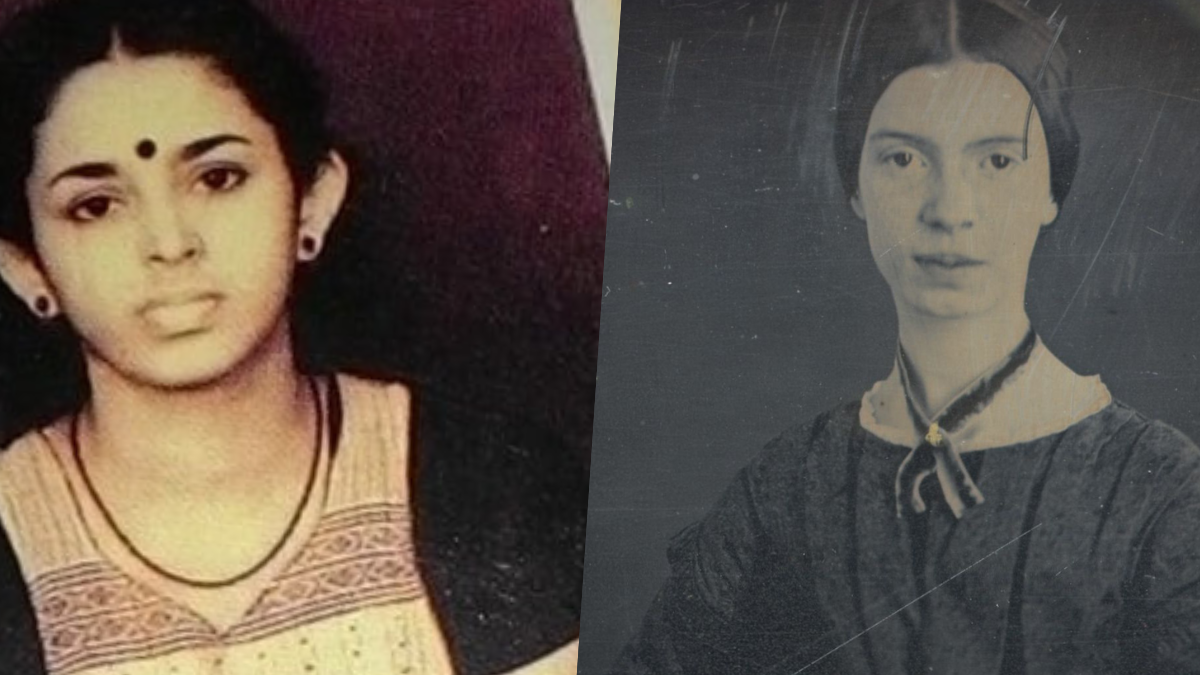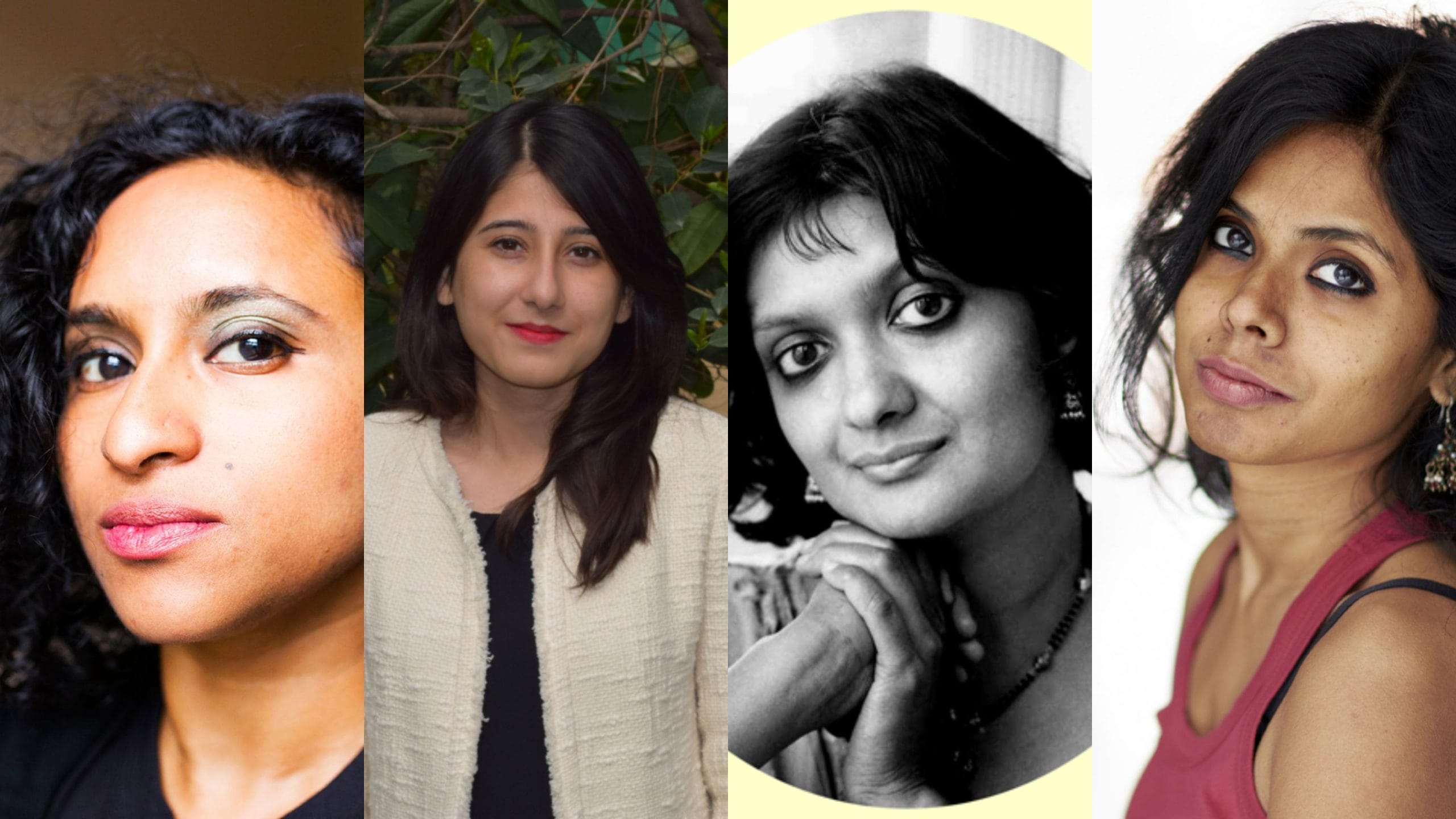Tishani Doshi is a poet born to a Welsh mother and a Gujarati father. She has published six books of poetry and fiction. Her work is inspired from everything ranging from news to the clouds, with a strong undercurrent of home-brewed feminism. She devoted many years of her life to poems, fiction and dance. Tishani with her work agrees, “to forgo my happiness, stab myself repeatedly and lower my heads into countless ovens.” (excerpt from Contract; book Girls are coming out of the woods)
1. Angikam Bhuvanam Yasya (Whose bodily movement is the entire universe)
“Return is never the experience you hope for.” Grace (protagonist; Small days and Small nights, Tishani’s latest book) and Tishani felt the same way about returning to Madras (as she likes to call it), a city that plays a part in her life upon the strength of being home. Tishani Doshi returned with a myriad of confusions. In this state of utter perplexity, she met a dancer and choreographer Chandralekha, who laughed about her own legacy and her abstractness in portrayal of the feminine energy was ineffable. Chandralekha happened to be in search of a dancer. Tishani as someone who had been trained in Kalaripayattu, seemed like the perfect fit for Chandralekha’s next and unfortunately last choreography.
Tishani Doshi is a poet born in Chennai to a Welsh father and Gujarati mother. She has published six books of poetry and fiction. Her work is inspired from everything ranging from news to the clouds, with a strong undercurrent of home-brewed feminism.
Sharira, was one of Chandralekha’s most celebrated and abstract theatrical dance pieces, which left behind cardinal questions, “Where does the body begin?Where does it end?” Tishani performed “Sharira” for 15 years. To Tishani, the experience of performing was more than just the 63 minutes on stage, often transcending beyond the body and the social construct of gender. Ardent influence of dance can be seen in the rhythm and flow of Tishani’s poetry. One would wonder, if words were bodily movements of expression and resistance on the stage of poetry.
Tishani’s work is deeply embedded in the political and historical landscapes of her experiences. Her art forces you to abandon the recklessness of time that comes with capitalistic culture and forces you to the tranquility of poetry. When asked about art, Tishani said, “I think all art comes from a sensual engagement with the world. Sensual, as in, of the senses – but also from lushness, from being in love with the world while abhorring certain things. I worked for many years as a dancer and so my primary engagement with the world is through the body, the visceral reality of the body – the dangers, the celebrations.” Thus, she takes the inherently subtle existence of the body beyond the physical, to the aesthetics of an integrated spiritual existence of the body and the soul.
2. Vachikam Sarva Vangmayam (whose speech is the universal sound)
A lot of Tishani’s work revolves around the body, injustice, love and loss yet there is a powerful marination in politics. Her poetry is universal at the same, completely internal, riveting and awakening. It forces you abandon your privilege and feel things beyond your one dimensional comfortable existence. Tishani’s poetic journey started in her childhood.
While talking to Feminism in India she said, “Not the desire to write necessarily, but a way of perceiving the world. For me, the world was and continues to be this thing of utter terror and beauty. So, from the beginning there was curiosity, fear, wonder, a need to make sense and find my place, and I see this as an initial poetic impulse. Later, it was a question of finding a vehicle to express all this.” Her poetry evolves from the female body, limited by fears and anxieties to the bliss and celebration of the universal feminine expressions.
Living in a country, where Hathras case, Nirbhaya case or Imrana case unfortunately happened, where thousands of stories go unheard, unreported and forgotten, Tishani’s poetry is reminder and an awakening telling you that their stories have not ended
In 2017, Tishani Doshi published a collection of poems titled “Girls are coming out of the woods.” The title poem was based on the 2012 Nirbhaya case, the following line is an excerpt from the same poem:
“Girls are coming
out of the woods, clearing the ground
to scatter their stories. Even those girls
found naked in ditches and wells,
those forgotten in neglected attics,
and buried in river beds like sediments
from a different century.”
The poem talks of all the girls who have been silenced in the darkness of misinterpreted ideas of masculinity and forgotten authority of consent. The silenced women unite, against the oblivion of humankind. And this time their voices will not be muffled. Darkness will have a voice “Girls are coming out of the woods. They’re coming. They’re coming.” Her poems are powerful and graphic and will stay with you, it “will follow you everywhere — to the dusty corners of childhood, to every downfall and resurrection.” (Contract; Girls are coming out of the woods)
Irish poet Bergson once said, “If reality impacted directly on our senses and our consciousness, if we could have direct communication between the material world and ourselves, art would be unnecessary.” Living in a country, where Hathras case, Nirbhaya case or Imrana case unfortunately happened, where thousands of stories go unheard, unreported and forgotten, Tishani’s poetry is reminder and an awakening telling you that their stories have not ended, their tales will not be told under the darkness of men but under the light of their reckoning, “Our vaginas have learned to shoot. They laugh and talk back (rapacious beasts). Our daughters feed them poems, Mr. Duterte!” (We will not kill you. We’ll just shoot you in the vagina)
Her first book of poetry, i.e Countries of the body, won the Forward Poetry Prize (Best First Collection) in 2006. The Pleasure Seekers was Tishani’s first novel. It was published in 2010, and was shortlisted for the Hindu Best Fiction Award, and long listed for the Orange Prize for Fiction and the International IMPAC Dublin Literary Award. Her latest book is Small days and Small Nights, which was launched by Salman Rushdie and has gained appreciation world wide. Her poems received wide recognition, the poem Girls are coming out of the woods was picked up during the Irish abortion referendum and shared in Australia during talks about gender violence. No boundaries seem to stand against the power of her words.
Also read: Indian Hip Hop Is A Man’s World
3. Aharyam chandra Taradi (Whose ornaments are the stars and the moon)
Tishani Doshi’s poetry to me is faith in feminism reborn. The question arises in our minds: What does feminism mean to Tishani? She says, “When Nina Simone was asked what freedom meant to her, she said, ‘No fear,’ and I’d say that’s what feminism means to me too. It’s about imagining, inhabiting a body where you would feel no fear, about replacing current power structures with more equitable, inclusive structures. The future of feminism in India has to be intersectional, it has to be about tearing out the roots of caste and patriarchy, about remembering, resisting, and reclaiming.”
Unending resistance against the systemic oppression can be seen heavily reflected in her poetry. In her poems titled Meeting Elizabeth Bishop in Madras, she says,
“And what can be said about darkness after all?
About men who board buses with iron rods?
What can be said about all the dragging and laying of bodies to earth?
Of landfills of lacerated breasts and vaginal scree, of girls hanging from mango tree?”
The poem starts off as a regular woman waiting at her dentist’s clinic, flipping through pages of “fashion magazines”. Which are based on the idea of, “Women succumbing to other women, wanting to inhabit other voices , other tongues.” (Meeting Elizabeth Bishop in Madras) From there, the poem takes off to being a universal statement. There is longing for fearlessness, hope to be liberated from the sense of fear, that every woman who reads the news, watches her neighbor, known a maid or had an uncle carries around subconsciously.
4. Tum Numah Satvikam Shivam (To that pure Shiva we bow)
As American writer Jay Parini says, “Poets peer into dark places and speak for those who have no voice. They wonder into the cities and forests, with eyes and ears open, and report on these experiences with astonishing candor and subtleness.” That is Tishani Doshi, her words will stay with you long after you have left her book, your consciousness will return to her words. There is no escaping it. Politics, violence, monsoon, the journey of art continues like the perpetual hands of time.
Also read: Siddhesh Gautam AKA ‘Bakeryprasad’: The Anatomy Of An Art Baker
“The poets my friend, are where they have always been—
living in paper houses along rivers
and in forests that are disappearing.
And while you and I go on with life remembering and forgetting
the poets remain: singing, singing.”
Find The Poets, Tishani Doshi
About the author(s)
Shivani Menon is an ardent reader and cinephile, who spends most of her time amidst books and the remaining time binging on classic movies. She describes herself with a quote by Sartre, "I exist, that is all and I find it nauseating."




